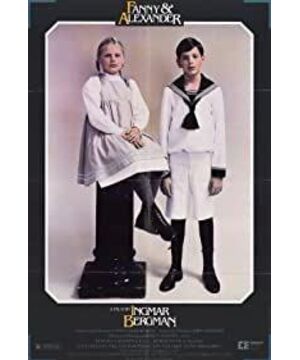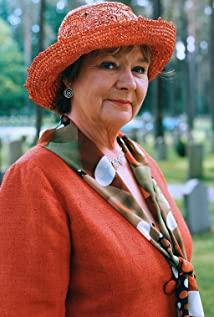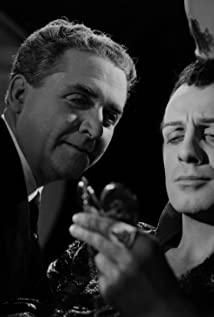The movie has been on the hard disk for some time, and every time I want to watch it, I open it and see more than 5 hours, ah! It turned off immediately. It's like a tome book, it needs enough patience and perseverance to bear its weight. The last time I read this kind of tome was back to the six-hour "A Splendid Life". On Friday night, I clicked it again with a little curiosity.
I have to say that the name of the movie is a bit confusing. Alexander can be regarded as the protagonist, but he bears more of the perspective and expression of meaning given to him by the director. From his perspective, the love-hate entanglement of the Aikoda family is given by the director. His distinctive image, while Fanny's role is relatively much less, her appearance is obviously to foil Alexander. Although the name of the movie is Fanny and Alexander, the object of performance is the Ikoda family, which is dominated by their fathers.
In Sweden on the eve of Christmas Eve in 1907, the annual celebration program was staged in the theater of the Akoda family. Waiting for the audience before the program started, the camera swept across faces with different expressions, some with serious faces, others with different expressions. Whispering, whispering, and snoring (Carl).
On the other hand, the eldest grandmother of the family, Helena, was nervously arranging with the servants at home, waiting for the return of the family. In front of the dressing table, the old maid said to the hostess with emotion, "This is our forty-third year together. It's Christmas", the old grandmother's mood surged, and she concealed her sentimentality, but forced the other maid to look unhappy.
Then, Ithaca exchanged good night with his nephew at the antique store, and arrived at his grandmother's house before everyone in the theater. The old lover met and was very cordial.
Later, the three aunts and six grandmothers came one by one and kissed the old grandmother one by one. The blowout appearance of the characters made me not understand the relationship between the characters of the Ekoda family in the first half hour, even though I knew that Carl and Gustav were brothers, it was until they went to the bishop to negotiate together. It was only then that it was confirmed that Carl was the second brother.
Before continuing to write, let's sort out the main character relationships:
Helena: Grandmother, who used to be a theater actor, and her husband (deceased) who was a theater director.
Isaac: Runs an antique shop, Helena's young lover, later lifelong friend, has two nephews.
Oscar: Eldest son of the Ikoda family; wife, Emily; children, Fanny, Alexander.
Carl: Second son, wife Lydia (German), no children.
Gustav: youngest son; wife, Elma; lover, Wheat (maid); children, Petra, Kenny, Pute, Helena Victoria.
After figuring out the relationship between the characters, let's take a look at the plot that began to unfold on Christmas Eve. Let's start with grandma.
Christmas Eve seems to be a gathering of everyone and joy. Behind this joy, everyone has an unknown story.
The elderly grandmother, although she has a lot of children and grandchildren, can not dispel the loneliness of old age. Usually, there are only a few faithful maids in the huge house. Her ex-lover, Isaac, has not left yet. At four in the morning, she indulged in the sleepy Isaac on the sofa and shared the past, but did not realize that the other party was asleep, and Isaac also tried his best to restrain his sleepiness. , accompany her to look back on the past. Happy days always pass, she sighed, but there were no tears in the corners of her eyes, recalling that when her husband came home and bumped into Isaac's hand into her clothes, the two laughed and burst into tears. Isaac is still the old Isaac, and he doesn't forget his romance when he gets old (he even flirts with the old maid at the dinner table), but Helena is not the Helena she was when she was young, and she has more old-fashioned restraint. She is the old lady Shi of Jia's house, and she has the prestige as the highest elder. She is also Fermina in "Love in the Time of Cholera". Time did not dilute her affection for her old lover, and she is also the Wu in "One Hundred Years of Solitude" Ursula, witnessed the changes of the family, life and death, Oscar's death, and the birth of Mai's child...
The most impressive thing is that, looking at the figure of Emily's remarried bishop leaving in front of the window, she said like a prophet, "Emily will still come back, very soon."
The loneliness of the elderly is a common topic, but I have experienced it personally. Grandpa has many children and grandchildren, in addition to eight children, there are also many grandchildren and great-grandchildren. A few years before his death, he was also guarding the big empty house by himself. Only on his birthday every year did everyone get together, but it was more like a routine, and the descendants seemed to obey a kind of etiquette. I need to seek my own psychological and moral peace of mind, and not many people accompany my grandfather to talk, chat, and listen to him talk about old things. Everyone played in groups of three or five, each played their own way, and finally left the scene, leaving Grandpa alone.
In the eyes of the old grandmother, Oscar is a model son, Emily is a model daughter-in-law, the kind of person who can always arrange everything properly and make people feel at ease. Oscar took over the theater from his father, and he is also one of the actors himself. From the details of his speeches in the theater, reminding his children to pay attention to etiquette at the dinner table, and asking the children to recite prayers before going to bed, we can see that he is a good son in the traditional sense. , a good husband and a good father, but this is not the only "stereotype". In the children's bedroom, he grabbed a wooden chair and made up a bizarre story, which shocked the children. "Shh! Be careful, don't let your mother hear it", being serious with children, and being able to mingle with them.
In the last scene of the rehearsal, "Hamlet", he still played the role of the ghost on the tower (the ghost of the father of the Danish prince Hamlet, killed by his younger brother), but this time he really became a ghost. When he was dying, he said to his wife Emily, "Everything is business as usual, the funeral is simple, and I just need to play Chopin's "Funeral March" for me at the funeral.
At grandfather's funeral, gongs and drums rang out, firecrackers lined the road, and a mighty funeral procession passed through the fields, through the villages, and into the mountains.
A year after Oscar's death, Emily left the theater, remarried the bishop, and took Fanny and Alexander into the realm of the devil.
To this day, I am still deeply impressed by the phrase "I hold not only legal justice, but also moral justice", which the bishop has repeated many times.
It is undeniable that Emily and Oscar are happy together, but they are so ordinary and gentle. After Oscar's death, she seems to have awakened and feels that she needs to explore more possibilities in life. If it can burn like a fire , I don't want to be a quiet candlelight. Facing the oppressive atmosphere in the bishop's house, she comforted Fanny and Alexander at the beginning, and gradually they got used to it and improved. But she didn't know that she was walking into the abyss step by step. When she finally realized it, she went to Helena to ask for advice. She was already stuck in the mud and couldn't extricate herself. of double justice.
Can we be too harsh on Emily? At least after she returned to the Akoda family, the family still welcomed her. Emily in reality is not uncommon. If the Oscars did not die suddenly, they would still be model daughters-in-law in the eyes of grandmothers, and they could more or less suppress their personalities. Because it is sometimes difficult for people to juggle multiple roles, for example, in order to do a good job as a housewife, give up high-paying job opportunities, and let her husband support the family. Even if you can be outstanding in certain aspects, you are willing to sacrifice for the family. But once this balance of life is broken, the previously suppressed personality may explode due to various incentives, like a sudden awakening of female consciousness, unwilling to be a male vassal.
The same is true of Wheat, who cried to Emily and told Emily that Gustav had been so nice to her that he had to run a café for her, but she would have preferred to go to Stockholm with Petra to work. Economic independence can lead to personal independence. She also didn't want to be a vassal of Gustav all her life.
Carl and his wife are a contradictory combination, and only Lydia can tolerate Carl. It is hard to imagine how they came here over the years and how much pain Lydia has experienced.
Carl is a university professor, or to be precise, a frustrated university professor. He is strict with himself spiritually and has rich feelings, but his life is always in a state of near bankruptcy.
In the previous few shots, I dozed off in the theater on Christmas Eve, was forcibly dragged away by my wife while singing with friends (rushing to Helena’s house for a dinner party), I didn’t intend to participate in the conversation of the crowd, and took the children to play in the corridor. In the game of "gunfighting" (farting), Alexander held a candlestick with three candles behind Carl's cocked buttocks, and suddenly there was a loud noise, the candles were blown out by unknown gas, the camera fell into darkness, and I was in front of the screen. Laugh out loud. This is Carl's naughty.
Going home after Christmas Eve, Carl held a wine glass and complained that there was no heating in the house, and Lydia said that because of too much debt, the carpentry had stopped giving credit. Then Carl started a series of complaints about Helena's unwillingness to borrow money, the infertility of his wife, being scolded by the dean for not paying attention to the lecture notes, and the damn morning class tomorrow. All kinds of unhappiness in life are within the scope of his cursing, including his wife's tolerance and love for him. In his opinion, Lydia's love is "low-handed" and not worthy of him. On the other hand, he You immediately apologized and said that he knew he was too mean, and before the audience could forgive him, he immediately continued to curse, and then fell into the pain in his heart, life is nothing. This is Carl's meanness.
When negotiating with the bishop, Carl has always maintained politeness and restraint, seeking the possibility of a peaceful solution, and at the same time sticking to his own principles amicably. For Gustav's outspokenness, he exposed the hypocritical face of the bishop, and couldn't wait to show his trump card. He couldn't stop scolding "you are such a mindless SB", and the result confirmed his idea, the bishop was not frightened by him, and then released his ultimate move (Emily). This is Carl's cleverness.
Carl's wife, Lydia, seems to have only the "stereotype" of resignation from beginning to end. But Carl's ability to like her definitely proves that he has a personality that can attract him, although we don't know how she and Carl met. On Christmas Eve, accompanied by the piano, she sang aloud, everyone was silent, and the camera Facing Carl, Carl kept drinking, watching her perform an emotional bel canto, and burst into tears.
Gustave has maintained his likable image, admitting that he pursues sex and knowing that his wife, Elma, can accept his promiscuous behavior, as Helena said, as a restaurant owner , has a shrewd business mind, but does not have the ability to handle his own private life.
I also admire Elma, she has the shrewdness of a woman, she has seen through Gustav long ago, and knows that no matter how many women he provokes, she will eventually return to her arms. On Christmas Eve, Gustav hugged Wheat in front of her, Emily asked, "You're not jealous," she said, "I think it's funny." This is Elma's self-knowledge and sacrifice, if she Jealousy, crying and fussing, maybe their husband and wife relationship will be more difficult to maintain than Carl and his wife. It's okay to be deceiving yourself, but for some people, you don't need to live so thoroughly.
View more about Fanny and Alexander reviews











